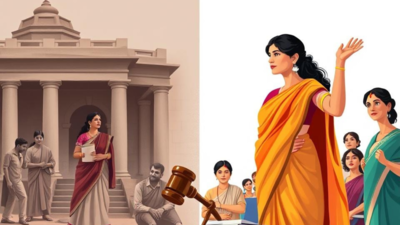1. Constitution of India
- Article 14: Guarantees equality before the law and prohibits discrimination.
- Article 15(1): Prohibits discrimination based on sex.
Directive Principles of State Policy:
- Article 39(d): The State shall, in particular, direct its policy towards securing— (d) that there is equal pay for equal work for both men and women;
- Article 42: The State shall make provision for securing just and humane conditions of work and for maternity relief.
2. The Protection of Women from Domestic Violence Act, 2005
Why Women Must Know: Domestic violence is not just physical abuse; it includes emotional, sexual, and economic abuse. Many women endure suffering due to a lack of awareness about their right to protection and legal remedies.
- Section 3: Defines domestic violence to include physical, emotional, sexual, and economic abuse.
- Section 18: Grants protection orders preventing an abuser from causing further harm.
- Section 19: Ensures residence rights, allowing a woman to stay in her matrimonial home.
- Section 20 & 22: Provides financial compensation, maintenance, and damages to victims.
3. The Dowry Prohibition Act, 1961
Why Women Must Know: Despite legal prohibitions, dowry-related harassment and deaths continue to occur. Women must understand their right to refuse dowry demands and take legal action against perpetrators.
- Section 3: Penalizes giving or taking dowry with imprisonment up to 5 years and fine.
- Section 4: Criminalizes demands for dowry, directly or indirectly.
4. The Sexual Harassment of Women at Workplace (Prevention, Prohibition, and Redressal) Act, 2013
Why Women Must Know: Many women experience workplace harassment but hesitate to report it due to fear of retaliation or job loss. Awareness of legal rights ensures women can work in a safe environment.
- Section 2(n): Defines sexual harassment as unwelcome advances, remarks, and physical contact.
- Section 4: Mandates every workplace with 10+ employees to set up
an Internal Complaints Committee . - Section 9: Provides a mechanism for filing complaints confidentially.
5. The Hindu Succession Act, 1956
Why Women Must Know: Many women are denied their rightful share in family property due to outdated customs. Legal awareness helps women claim their inheritance.
- Section 6-A: Grants daughters equal rights in ancestral property.
- Section 14: Recognizes a woman’s absolute ownership of her property.
- Section 15: Ensures a woman’s heirs inherit her self-acquired assets
6. The Muslim Women (Protection of Rights on Marriage) Act, 2019
Why Women Must Know: Many Muslim women suffer due to instant triple talaq. This law provides legal protection against arbitrary divorce.
- Section 3: Criminalizes instant triple talaq (talaq-e-biddat).
- Section 5: Ensures maintenance for divorced Muslim women.
7. The Maternity Benefit Act, 1961 (Amended 2017)
Why Women Must Know: Many women are unaware of their rights to paid maternity leave and workplace support during pregnancy.
- Section 5: Grants women 26 weeks of paid maternity leave.
- Section 11A: Mandates crèche facilities for establishments with 50+ employees.
- Section 12: Protects women from termination due to pregnancy.
8. Bharatiya Nagarik Suraksha Sanhita and Bharatiya Nyaya Sanhita – New Criminal Laws
- Section 69 (
BNS ): Criminalizes sexual intercourse under deceitful means, including false promises of marriage, with a punishment of up to ten years imprisonment and a fine. - Section 78 (BNS): Defines stalking as a man’s repeated attempts to contact a woman despite her clear disinterest, or monitoring her electronic communications. Exceptions include actions for crime prevention, legal compliance, or justified circumstances. Penalties range from up to three years’ imprisonment and fines for a first conviction, to up to five years’ imprisonment and fines for subsequent conviction
- Section 85 (BNS): If a husband or his relatives subject a woman to cruelty, they can face imprisonment of up to three years and a fine. This provision aims to protect women from domestic violence, harassment, and abuse within marriage, reinforcing legal consequences for mistreatment by in-laws and spouses.
- Section 184 (BNSS): A medical examination of a rape victim (or victim of an attempt to rape) must be conducted by a registered medical practitioner in a government or local authority hospital within 24 hours of receiving information, with the victim’s consent or that of an authorized person. The medical report must include the victim’s details, injuries, mental condition, and material for DNA profiling, along with reasons for conclusions and time of examination. The report must be forwarded to the investigating officer within seven days, who will submit it to the
Magistrate . No examination can be conducted without consent. - Section 179 (BNSS): Women cannot be compelled to appear at a police station or any other place outside their residence for questioning during an investigation. Instead, their statements must be recorded at their place of residence, ensuring their safety and convenience. However, if a woman willingly chooses to attend the police station, she may be permitted to do so. This provision safeguards women from unnecessary distress and ensures greater sensitivity in police procedures.
- Section 180 (BNSS): During an investigation, police officers can examine witnesses, but a woman’s statement in cases involving sexual offences, stalking, voyeurism, and other crimes against women must be recorded only by a woman police officer or any woman officer. Additionally, statements may be recorded through audio-video electronic means to ensure accuracy and transparency. This provision enhances victim protection, prevents intimidation, and ensures sensitivity in handling cases involving women.
9. The Equal Remuneration Act, 1976
Why Women Must Know: Its principles remain crucial for ensuring workplace equality.
- Section 4: Mandated that employers provide equal pay for equal work, regardless of gender.
- Section 5: Prohibited gender discrimination in recruitment and promotion.
No exemption from the Act can be claimed by an employer on the ground of financial incapability
10. Legal Services Authorities Act, 1987
Why Women Must Know: Women from marginalized communities often struggle to afford legal representation.
- Section 12: Grants free legal aid to women, children, and economically weaker sections




